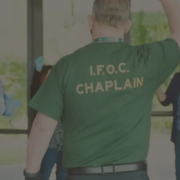Why does Chaplain certification matter when responding to a crisis?
Crises come in all shapes and sizes. While some crises can be resolved with a few simple steps, others might require the expertise and training gained through certification. Regardless, when a crisis occurs for either you or a loved one, knowing how to respond is critical.
Most of us respond to a crisis with our best intentions. We rush over to help any way we can, even if we don’t know what the individual or situation needs at that exact moment. However, no matter how well-intentioned you are, sometimes your response to a crisis can unintentionally do more harm than good.
So, what do you do if the crisis calls for more than you’re equipped to handle? How do you better prepare yourself for the next time a crisis strikes in your community? If you have the heart to serve and help others, especially during a crisis, Chaplain certification might be the next step for you.
What is chaplain certification?
Chaplain certification is the credentialing and training of what to do, and what not to do when working with someone who has experienced a crisis – whether that’s through ministry, counseling, service, advocacy, or bridging the gap between secular and spiritual environments in a community.
It also provides professional identification, proving that you have been trained and vetted to perform services as a Chaplain. This is helpful when the local, state, and federal agencies in charge of crisis situations are leery of allowing just anyone to have access to those impacted by a crisis or disaster.
In those specific situations, they are looking for someone with credentials, either from a government agency or from a non-profit that is a member of the National VOAD, whom they can count on to do good and not harm.
As a credentialed Chaplain, you are able to bring life-changing services to every sector of life, such as health and welfare, education, transitional living, emergency service, communities, and governmental support. Without the certification, your sphere of influence and impact can only go so far.
Chaplain certification training helps provide the tools you need so that you can both respond, not only with the best intentions but also with the best skills possible to provide help to those who need it.
Here at the I.F.O.C., we provide training to handle all types of crises. We also have a network of Chaplains across the world to assist in supporting one another with experience and knowledge.
Three ways to be credentialed.
Being prepared and properly equipped to help someone through a crisis is deeply important. Through the I.F.O.C., a chaplain may be credentialed in one of three ways:
1. Licensed
A Chaplain license is awarded to individuals who qualify by the International Fellowship of Chaplains. A licensed Chaplain is clergy and is similar to a licensed minister. Where a minister is trained and licensed to work with members of their church, Chaplains are trained and licensed to work with people outside the walls of the church. Ministers care for congregants and Chaplains care for people who may not be part of the same faith and who may be in crisis.
2. Ordained
An ordained Chaplain is someone who has a Chaplain license and who also has been granted an ecclesiastical endorsement from the International Fellowship of Chaplains. An ordained Chaplain has shown that they have a calling from God on their life for this type of ministry.
3. Commissioned
A commissioned Chaplain is someone that I.F.O.C.’s parent ministry, Frontline Chaplains International, has commissioned to be a Chaplain in their home nation(s). This level of credentialing is not awarded in the United States or Canada. A commissioned Chaplain attends a Chaplain training class (either online or in-person in a foreign mission’s training class), has different credentialing requirements, and is not covered by the ministry’s U.S. insurance policy which means they cannot wear I.F.O.C. Chaplain identification inside the U.S. & Canada.
Why does certification matter when responding to a crisis?
Many Christians want to help in times of crisis, but either do not confidently know what to do to help or do not have access to those going through the crisis.
Being certified as a Chaplain is a powerful resource for those who want to help others in times of need. It not only gives you the tools and training to better help someone overcome a crisis in a healthy way, but it also gives you the access you may need to make an impact.
Imagine wanting to help someone through a disaster or crisis, only to be sidelined by the authorities. With Chaplain certification, you will have the ability to build relationships with the authorities, prove you are skilled, obtain access to those in need behind the yellow tape, and make a greater impact in their lives.
No one should have to go through a crisis alone.
If you have a heart to serve others and your community in times of crisis, don’t watch from the sidelines. You were created to bring hope to the hurting, and with a Chaplain certification, you can do just that.
Join over 1,800 Chaplains who are active and currently credentialed by I.F.O.C to bring care in the areas of police, fire, medical, prisons, search & rescue, sports, colleges, hospice, nursing homes, bikers, community support, and more.


